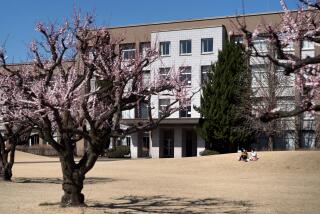Superior Education Gives Japan World Trade Edge
- Share via
As a Japanese national who was educated at both Japanese and American public schools, I can personally attest to the quality of the Japanese educational system described by Denis P. Doyle and Jerry W. Hartle (Editorial Pages, Oct. 7), “Superior Education Gives Japan the World Trade Edge.”
Educationally, the Japanese do push their children extremely hard, almost to the point where I believe many are robbed of their childhood. Children are often taken straight from the public school sessions to private group tutoring schools; they are given extensive homework assignments to be done every day, even during their short summer recess.
There is constant and extreme pressure to pass the entrance exams to the top schools and colleges. (As a 6-year-old, I failed the entrance exam to a top private elementary school.) Education is taken so seriously, I would be surprised if the Japanese did not have the highest IQs in the world. But it is not without its price, and I’m not sure I would wish it on the American kids. I am of the conviction, too, that American kids would never submit to that kind of educational pressure. They are too free.
However, one thing that American kids might do well to imitate of their Japanese counterparts is the deep respect the Japanese have--for their teachers, their classrooms, their learning materials, and each other. For example, most Japanese schools don’t have custodians that clean after the students. The students themselves clean up the classrooms, the grounds, and even the toilets, in a rotating system of assigned groups. The job gets done every day, with or without faculty supervision. Needless to say, graffiti and vandalism are rarely a problem.
There is much else to be said about the attitudinal difference between the American and Japanese schoolchildren (not all of it pro-Japanese, incidentally). There isn’t space to elaborate in this type of a letter. But suffice to say the famous dedication of workers and the logically ensuing quality of the work product of the Japanese didn’t come out of the blue sky. It is just a logical progression of fostered attitudes from school days since kindergarten.
Personally, I’ll take a Japanese product over an American one anytime. I’m not saying the American products are shoddy, but they are more of a hit-or-miss proposition than those produced by the highly quality-conscious Japanese. I care for American workers, but don’t see myself in the position to give charity to them by purchasing American goods just on the basis of them being American made.
That is not to imply that American workers are irrevocably and irredeemably inferior to those in Japan. In fact, American workers are more spontaneous and free in spirit, and have a great edge in pure creativity than the Japanese. Japanese creativity dies under the extreme suppressive tendencies of their educational, familial and other societal systems where conformity reigns supreme.
Their idea of creativity is to steal American ideas and polish them. Only if we can harness our incredible and dynamic labor force by borrowing a little Japanese love of discipline and respect, add a little more staying power and dedication, a little more of “what can I give to this” instead of “what’s in it for me?”, the American labor force would be second to none.
If a little country like Japan with no natural resources can labor-force its way to the highest quality goods in the world, the potential for the American labor force is awesome. The potential of dissipation from lack of application is awesome, too.
CAROL TSUCHIDA
Glendale
More to Read
Sign up for Essential California
The most important California stories and recommendations in your inbox every morning.
You may occasionally receive promotional content from the Los Angeles Times.













